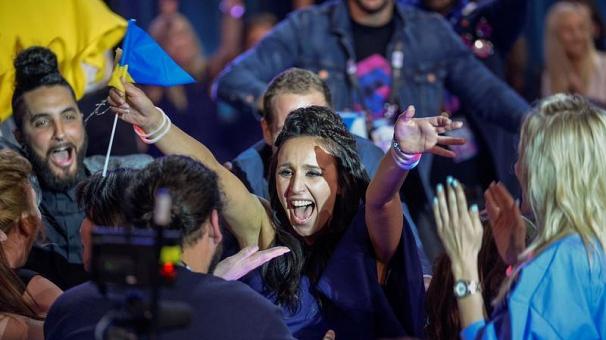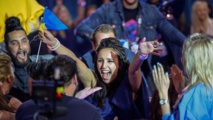Russian singer Sergei Lazarev -- the clear favourite with bookmakers before the contest -- was beaten into third place after losing out on the national jury tallies despite claiming the most points from viewers in the public vote.
It is not the first time the Eurovision Song Contest has raised political hackles, despite "lyrics, speeches, gestures of a political or similar nature" being banned at the competition.
"It was not the Ukrainian singer Jamala and her song '1944' that won the Eurovision 2016, it was politics that beat art," Frants Klintsevich, a member of Russia's upper house of parliament told local news agencies, calling for his country to boycott next year's tournament in Ukraine.
Russia and Ukraine have been locked in a bitter feud since Moscow annexed Crimea from Ukraine in February 2014 and was then accused of fuelling a bloody uprising by pro-Russian rebels in Ukraine's east.
At Kiev airport, hundreds of people shouting "Crimea is Ukraine" acclaimed Jamala, who is of Crimean Tatar stock, on her return from Stockholm.
Fighting back tears the 32-year-old singer said the win meant "my story has been heard, the story of Crimean Tatars has been heard, the story of Ukraine has been heard."
Yet "1944" was not a patriotic song, she insisted, adding that the Eurovision "has always had a somewhat political character" simply because so many countries were competing on the same stage.
- 'War won' -
Ukrainian President Petro Poroshenko was among the first to congratulate Jamala after her win.
"Yes!!!", he wrote on Twitter after the results were announced. "An unbelievable performance and victory! All of Ukraine gives you its heartfelt thanks, Jamala."
In Russia by contrast, the mood was one of bitter disappointment.
"The Eurovision was transformed into a political battle," Alexei Pushkov, head of the foreign affairs committee in the lower house of parliament, accused in a tweet.
His counterpart in the upper house, Konstantin Kosachev, took a similar view, declaring "it was geopolitics that gained the upper hand."
Kochachev said that the Eurovision victory could embolden Ukraine's pro-Western leadership, jeopardising efforts to resolve the conflict in eastern Ukraine.
"For that reason Ukraine lost," he wrote on Facebook.
"The thing the country needs now as much as air is peace. But war won."
Remarkably, the tensions between the two neighbours were not reflected in the public vote by viewers, with Ukrainians choosing Russia's entry as their favourite and Russia ranking Ukraine second -- a sign of the enduring ties between many people on either side of the border.
Russian state television had played down the themes of Ukraine's winning song prior to the victory announcement but on Sunday also slammed the choice as political.
"The viewers picked Russia to win, the experts chose Australia but in the end Ukraine won first place," a female news anchor on Perviy Kanal said as she introduced the segment.
"How the European jury stole victory from Lazarev" was the headline on an article on the website of the mass-circulation tabloid Komsomolskaya Pravda.
- 'Victory of values' -
Politics and history have often weighted heavily on the Eurovision.
Last year, Armenia was asked to modify the lyrics of its song "Don't Deny", for pointing too directly at Turkey's refusal to describe the massacre of Armenians a century earlier by Ottoman Turks as "genocide".
In 2014, the votes cast in Crimea were counted as Ukrainian, ignoring the fact Russia had annexed the region.
And the French and the British like to blame their string of Eurovision flops on geopolitical alliances, claiming that the Nordics vote for the Nordics, the Slavs for the Slavs and the former Soviet republics for their kin.
"Any victory for Ukraine is going to annoy the Kremlin," Ganna Gopko, the head of the international affairs committee in Ukraine's parliament, told AFP.
"This is not just a victory at Eurovision, it is a victory of values".
---------------------------------------------------------------------------------------------------------------------
It is not the first time the Eurovision Song Contest has raised political hackles, despite "lyrics, speeches, gestures of a political or similar nature" being banned at the competition.
"It was not the Ukrainian singer Jamala and her song '1944' that won the Eurovision 2016, it was politics that beat art," Frants Klintsevich, a member of Russia's upper house of parliament told local news agencies, calling for his country to boycott next year's tournament in Ukraine.
Russia and Ukraine have been locked in a bitter feud since Moscow annexed Crimea from Ukraine in February 2014 and was then accused of fuelling a bloody uprising by pro-Russian rebels in Ukraine's east.
At Kiev airport, hundreds of people shouting "Crimea is Ukraine" acclaimed Jamala, who is of Crimean Tatar stock, on her return from Stockholm.
Fighting back tears the 32-year-old singer said the win meant "my story has been heard, the story of Crimean Tatars has been heard, the story of Ukraine has been heard."
Yet "1944" was not a patriotic song, she insisted, adding that the Eurovision "has always had a somewhat political character" simply because so many countries were competing on the same stage.
- 'War won' -
Ukrainian President Petro Poroshenko was among the first to congratulate Jamala after her win.
"Yes!!!", he wrote on Twitter after the results were announced. "An unbelievable performance and victory! All of Ukraine gives you its heartfelt thanks, Jamala."
In Russia by contrast, the mood was one of bitter disappointment.
"The Eurovision was transformed into a political battle," Alexei Pushkov, head of the foreign affairs committee in the lower house of parliament, accused in a tweet.
His counterpart in the upper house, Konstantin Kosachev, took a similar view, declaring "it was geopolitics that gained the upper hand."
Kochachev said that the Eurovision victory could embolden Ukraine's pro-Western leadership, jeopardising efforts to resolve the conflict in eastern Ukraine.
"For that reason Ukraine lost," he wrote on Facebook.
"The thing the country needs now as much as air is peace. But war won."
Remarkably, the tensions between the two neighbours were not reflected in the public vote by viewers, with Ukrainians choosing Russia's entry as their favourite and Russia ranking Ukraine second -- a sign of the enduring ties between many people on either side of the border.
Russian state television had played down the themes of Ukraine's winning song prior to the victory announcement but on Sunday also slammed the choice as political.
"The viewers picked Russia to win, the experts chose Australia but in the end Ukraine won first place," a female news anchor on Perviy Kanal said as she introduced the segment.
"How the European jury stole victory from Lazarev" was the headline on an article on the website of the mass-circulation tabloid Komsomolskaya Pravda.
- 'Victory of values' -
Politics and history have often weighted heavily on the Eurovision.
Last year, Armenia was asked to modify the lyrics of its song "Don't Deny", for pointing too directly at Turkey's refusal to describe the massacre of Armenians a century earlier by Ottoman Turks as "genocide".
In 2014, the votes cast in Crimea were counted as Ukrainian, ignoring the fact Russia had annexed the region.
And the French and the British like to blame their string of Eurovision flops on geopolitical alliances, claiming that the Nordics vote for the Nordics, the Slavs for the Slavs and the former Soviet republics for their kin.
"Any victory for Ukraine is going to annoy the Kremlin," Ganna Gopko, the head of the international affairs committee in Ukraine's parliament, told AFP.
"This is not just a victory at Eurovision, it is a victory of values".
---------------------------------------------------------------------------------------------------------------------









 Home
Home Politics
Politics











